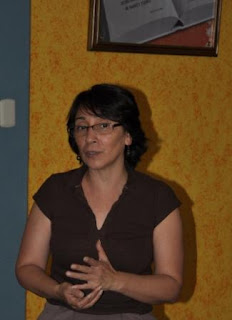By Daniel Velásquez
I was in Guatemala from September 2 to the 12 to support the work M.I.A. is currently performing in regards to Campaña Hombres Contra Feminicidio (Men Against Feminicide) and raising awareness among civil society organizations of the country’s needs for a Temporary Protection Status (TPS).
Training for Trainers
My first assignment was to lead a workshop for the Campaign facilitators. M.I.A. has recruited about 12 young college students from USAC to facilitate the campaign workshops at the National Police Academy, an elementary school in zone 8 and USAC itself.
My workshop focused on developing better presentation skills and introducing evaluation techniques. Part of the exercises were to lead a workshop and have a feedback session to identify strengths and weaknesses in their skills.
The facilitators were motivated throughout the workshop. Their excitement was noticeable, specially when they had to make posters for their presentation.
There was also a chance for Simón Pedroza, a poet and former facilitator, to share his experience with the Campaign.
The workshop ended with an evaluation of this same workshop. Among the feedback was the need the facilitator feel for more similar workshops.
Bus Driver Widows
In Guatemala City, many bus drivers have been killed by gangs that demand money for letting them work in the neighborhood the gangs themselves control. (Read more here)
For the past two months, M.I.A. has been meeting with a group of 5 bus driver widows and worked on ways for them to empower and help themselves have financial stability under the new circumstances. Many of these women have had little education and live in neighborhoods considered very dangerous. M.I.A. recruited two young women to help these women come up with a plan. After a few meetings, they decided to get training to start their own small business. M.I.A. gave these 5 women a micro credit to help them get their business started.
During this trip, I had the opportunity to visit one of the widows and learn first hand about her work. Both of the women we visited are managing their own food stand outside their homes. Among the feedback collected is the need for the women to get more training in accounting and managing their expenses and counting their profits.
Although the financial benefits of the micro credit will take a few months to show, the impact they have on the receipients are noticed immediately. The opportunity M.I.A. offers with the micro credit gives these women a boost to their self esteem: independence, control, confidence and a sense of pride and ownership for what they do.
Speaking Immigration at Canal VEA
Through Lucia Muñoz, M.I.A. Executive Director, I was invited to speak live on TV at a local cable channel, VEA Canal. The show was called “Conversemos” and was conducted by Karina Gonzalez de Rottmann. The topics of conversation were about the Temporary Protection Status (TPS), the xenophobic environment for Guatemalans in the U.S. and also the financial and emotional price of migrating from Guatemala to the U.S.
The overall interview went really well. However, I had to explain to Karina about my background as an immigrant and how I relate and get myself involved in the issues of those Guatemalans who live in the U.S. undocumented. I assumed I was not the stereotypical immigrant man he expected to meet.
The HCF Campaing at I.N.C.A.
During the month of September, M.I.A. was most active with the Hombres Contra Feminicidio Campaing at the all-female Instituto Normal para Señoritas Centro América, I.N.C.A. I had the opportunity to co-faciliate workshops there with Lucía Muñoz and Ana L. The topic for that week was sexual harassment.
The workshop made emphasis on the different ways that sexual harassment occurs. Students discovered that harassment often depends on the circumstances in which it happens and that when it does happen, it is due to a power inequality. They were also made aware of the harassment as something unwanted, discriminatory based on gender and sexual orientation, and it also creates an unhealthy emotional and physical environment for the victim. We also discussed how harassment is an expression of authority and power through sex.
Meetings at the Human Rights Ombudsman office
M.I.A. and the GPDN, represented by Lucía Muñoz and myself, respectively, met with the representative of Migrant Affairs at the Guatemala Human Rights Ombudsman office in order to coordinate a letter from the civil society and the Catholic church to the Guatemala President, Alvaro Colom, asking to pressure more the U.S. in asking for the TPS for Guatemalans in the U.S.
There were two more meetings to polish the content of the letter. It was delivered by activist and representatives of M.I.A. and GPDN on September 24 at the Presidential Palace. Prensa Libre reported on the event here.
Meeting Estudios Tecomate
Lucia Muñoz and I had a chance to meet Abner García from Estudios Tecomate and present to him the Hombres Contra Feminicidio campaign. Among the ideas that were discussed there were Abner’s own: podcasts.
Although podcasts are new territory for M.I.A., and me personally, I offered to write a script for the first show. Abner volunteered his time and expertise in audio technology to produce the shows.
The best part of working with Abner is his professionalism and quick delivery. In less than a month now M.I.A. has its first podcast AVAILABLE HERE. (spanish only)
———————————————————————————————————————
Daniel Velásquez is Guatemalan and a member of the Guatemala Peace and Development Network. Daniel has helped M.I.A. since its foundation with translating documents and production of graphic materials. He currently lives in New York.
M.I.A. is a founding member of the Guatemala Peace and Development Network, GPDN.





















 Proud Founder Member of the Guatemala Peace and Development Network
Proud Founder Member of the Guatemala Peace and Development Network